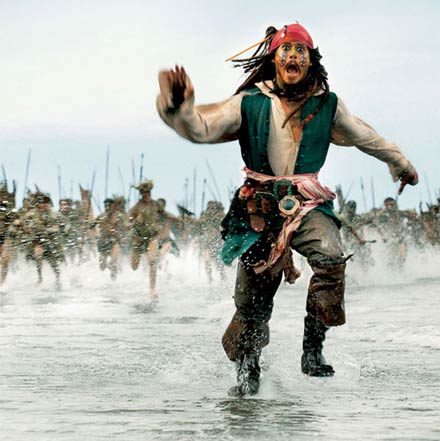I was trying to keep nice and quiet down in the front row today while the massive debate over ‘masculine’ films raged all around. Both sides had valid points (yes, that does sound like a cop-out, doesn’t it), but I was having a pretty hard time with them. While it is true that a film may appeal mainly to a certain gender, I completely disagree with the idea that this is due to the unwillingness of women to expose themselves to violence, gore, sex, etc.
This question is a tricky one because any side of the debate is forced to generalize about a huge number of people. However, taking into account that there will be numerous individual exceptions, I think that it is unfair to suggest that women avoid films like 300 (I haven’t seen it yet, so I’m completely objective–probably) primarily because of elements which are traditionally unappealing to women, or at least society’s concept of what women should take interest in. I agree that there are certain films that just hold more attraction for men, but I think that the real answer to this is so simple that we missed it entirely.
Consider three films: 300, Fight Club, and Casino Royale. From personal observation, the people who are really passionate about these films are nearly all male. Perhaps there is something about these that appeals to men and their ideas of masculinity. But it’s certainly not the violence and gore. (The news hasn’t been labeled ‘masculine’, despite its profuse amounts of both of the aforementioned elements, has it?) I wish I could confidently and conclusively state exactly what makes these movies so appealing to men, but there are so many factors that could be a part of it that it’s difficult to prove causation. However, in all three movies the main male characters are strong, confident, and brutal. (Not to mention simply dripping with testosterone.) Perhaps this appeals to men who are growing increasingly dismayed with the portrayal of men in recent films. Think about the feminization of Captain Jack Sparrow in Pirates of the Caribbean. Traditionally (and historically–mostly), pirates have been a pretty securely masculine symbol. Lots of ‘aargh’ing, hoisting sails with bulging biceps, and brutally slaughtering all who resist. Then in waltzes Johnny Depp (who I have absolutely nothing against, by the way) with massive amounts of eye makeup and a wholly unmanly swagger. Thus, pirates are ruined forever for male viewers as symbols of their masculinity. Super-heroes are out now too, because assumptions are made about men in spandex. (They’ve become either un-masculine or painfully unfashionable. Or both.) Pierce Brosnan’s suave James Bond was hugely popular with women, but not as much with male audiences. It has been conjectured that the return to raw masculinity and brutality is what attracts so many men and so few women to the new Bond movie. To [loosely] quote my best friend’s mother (who makes the most amazing tuna casserole, by the way), “The new Bond represents the male idea of what women want, rather than what actually appeals to women.” I’m going to take this even further and suggest that the new James Bond (and characters in the other movies mentioned above) may also represent what men WANT women to want. In a time when women are more empowered than they’ve ever been and new ideas of masculinity are emerging, maybe it’s nice to have something more traditional to cling to. Not because they necessarily believe that it’s what masculinity is truly about, but because they miss the old concept a little.
I realize that’s a pretty bold statement to make, especially since I know nothing about being a man. But it seems fairly likely that it could be a factor, at least. Am I onto something, or am I just guessing poorly? Guys, please let me know what you think of this idea. I’m very curious.
And finally, I want to dispute the statement that female critics didn’t like 300 because it objectifies women. Pause for a moment to consider the history of the film industry. Movies have been objectifying women for years. Not all movies, just certain types of movies in which feminism isn’t intended to play an important role. This hasn’t changed. A film should not be rejected on ideological or political grounds. It should be examined for things like quality of screenplay, acting, cinematography, cohesiveness, and impact, to name a few. And any respectable film critic will do just that, calling only upon opinions that are relevant to film analysis. In fact, it goes back to what Dr. Campbell was saying about being able to distinguish between “I like it” and “it’s good”. Because that’s incredibly important.

